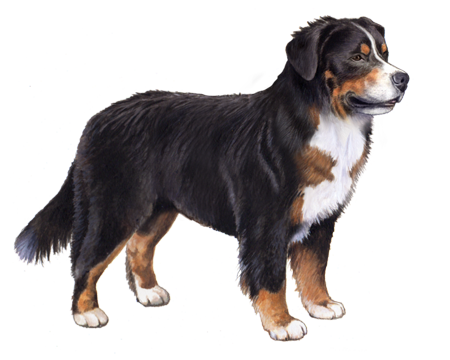
Newfoundland
The Newfoundland is a loyal, devoted breed with a loving personality. They may be massive, but their patience and gentle, sweet-tempered nature have earned them the nickname of “nanny dog.”
Interested in discovering if your dog is a Newfoundland?
Check out Wisdom Panel's DNA tests.

Newfoundland Traits
General Appearance
The most noticeable element of the Newfoundland’s appearance is its sheer size. The breed is large and muscular, with a massive head, heavy coat, and broad, strong tail.
Coat and Colouring
The Newfie has a flat, water-resistant double coat. The coarse outer coat is moderately long, while the undercoat is dense and soft. The coat comes in gray, brown, black, and white and black.
Distinctive Physical Traits
Despite its size, the Newfoundland is agile and relatively athletic. The breed has a massive head, dark brown, expressive eyes, and a smooth, effortless gait.
Newfoundland Temperament
Newfoundlands are known for their sweet dispositions. Add to that their social, patient, and loyal nature, and it’s easy to see why these dogs make great family pets. Newfies are intelligent and relatively easy to train. And they’re never shy or aggressive.


Newfoundland History
The Newfoundland originated in the Canadian province of Newfoundland and Labrador. Though one of the older dog breeds, its exact roots are a matter of debate.
Some say there’s evidence of a large dog similar to the Newfoundland in the archeological records of the early Algonquin and Sioux Indians. Other stories suggest European fishermen bred their dogs with native dogs found on the island. And according to one legend, a dog resembling the Newfoundland accompanied Leif Erikson when the Vikings landed on the coast of Newfoundland over 1,000 years ago.
The history of the Newfoundland became clearer in the late 1700s when the first document stories of the breed started to appear. The breed officially got its name in 1775, when a man by the name of George Cartwright gave the name to his dog. Fans of the breed, however, refer to them affectionately as “Newfies.”
The first Newfoundland club started in England in 1886. People bred the dogs for their considerable strength and their ability to cart and haul. In particular, fishermen used the dogs to pull their full nets out of the water. They also made exceptional water rescue dogs, thanks to their excellent swimming skills. Stories of the breed’s bravery and heroics are documented throughout history.
Newfoundland Care
Nutrition
Newfoundlands require high-quality dog food suited for their particular age—as well as any health concerns.
Newfoundlands are at risk for a dangerous condition called bloat. To help prevent bloat, break their food up into several meals a day, and use a specially designed food bowl to slow their eating. When timing meals, avoid feeding them immediately after any kind of vigorous activity—and wait at least an hour after meals before exercising them. These are just a few ways you can help prevent this life-threatening condition. A veterinarian is the best resource for other recommendations—including surgical options—for preventing bloat.
As with any dog, it’s important to monitor the amount of food and treats that you give your Newfoundland—especially since some dogs are prone to weight gain as they age. Your veterinarian is a good source for nutrition and feeding guidelines.
Grooming
A Newfie’s heavy coat requires regular grooming. Brush them at least once a week with a long-toothed comb and slicker brush to keep their coats healthy and mat-free. During periods of seasonal shedding, their coats need daily brushing.
All dogs need regular dental care, including at-home teeth brushing and professional dental cleanings. Maintaining good dental hygiene is important for their overall long-term health.
Exercise
Newfoundlands need at least 30 minutes of moderate exercise a day to stay healthy and happy. They enjoy outdoor activities and spending time with their people, so walks and hikes with the family are fun options. Or, take advantage of their love of water and head to the lake for a swim. They also enjoy dog sports, such as tracking and agility.
Training
Newfoundlands are smart and eager-to-please. Although they aren’t generally aggressive or shy, early socialization and training are important to help them be well-adjusted pups.
Obedience training is also essential because of their large size. Dogs as big as Newfoundlands are a handful if not properly trained. Newfies can be sensitive, and they don’t respond well to harsh training techniques. Positive reinforcement is the best way to train this breed.

Newfoundland Genetic Health Conditions
-
Cystinuria Type I-A
Dogs with Cystinuria are not able to reabsorb the amino acid cystine in their kidneys and therefore high concentrations can accumulate in the urinary tract resulting in formation of cystine crystals and stones that can cause obstruction.
Knowing if your Newfoundland is a carrier or at-risk for these conditions can help you and your veterinarian plan for your pup's lifelong care. With Wisdom Panel™ Premium, you can get results for over 200 genetic health tests.
Breed Group
Mountain Dogs
This genetic group was bred for hard work in mountainous regions. Characterized by their thick coats and sturdy, larger builds they quickly became the invaluable working companions of people in endurance activities such as drafting and hauling.








